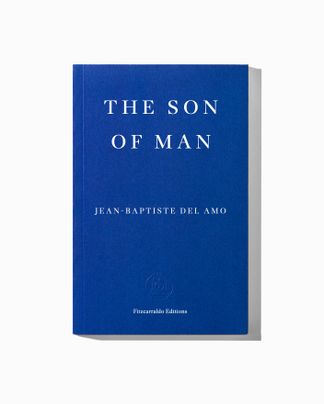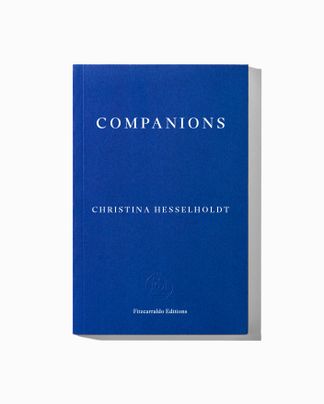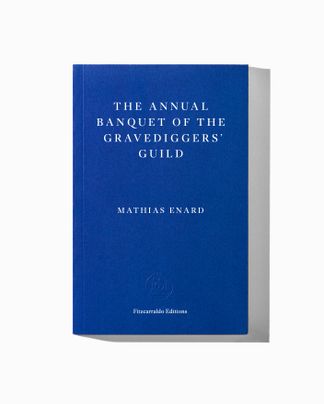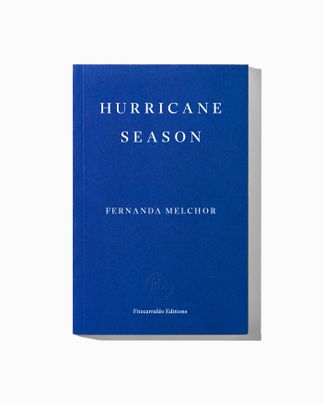Rico, Mark, Paul and Daniel were 13 when the Berlin Wall fell in autumn 1989. Growing up in Leipzig at the time of reunification, they dream of a better life somewhere beyond the brewery quarter. Every night they roam the streets, partying, rioting, running away from their fears, their parents and the future, fighting to exist, killing time. They drink, steal cars, feel wrecked, play it cool, longing for real love and true freedom. Startlingly raw and deeply moving, While We Were Dreaming is the extraordinary debut novel by one of Germany’s most ambitious writers, full of passion, hope and despair.
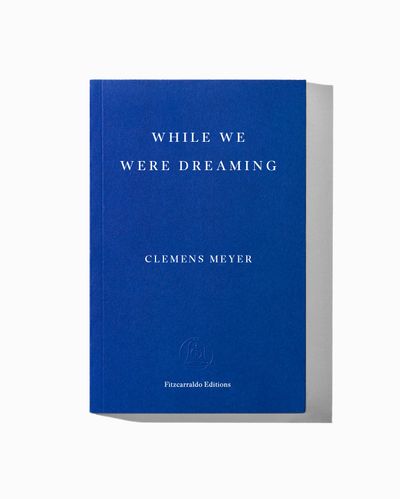
While We Were Dreaming
Translated by Katy Derbyshire
Published 30 March 2023 (UK) | 19 September 2024 (US) | French paperback with flaps, 528 pages
Longlisted for the 2023 International Booker Prize
While We Were Dreaming
Translated by Katy Derbyshire
CHILD’S PLAY
There’s this nursery rhyme I know. I hum it to myself when everything starts going crazy in my head. I think we used to sing it when we hopped about on chalk squares, but maybe I thought it up myself or dreamed it. Sometimes I mouth it silently, sometimes I just start humming it and don’t even notice because the memories are dancing in my head, no, not just any memories, the ones of the time after the Wall fell, the years we – made contact?
Contact to the brightly coloured cars and Holsten Pilsener and Jägermeister. We were about fifteen back then and Holsten Pilsener was too bitter for us, so we’d usually drink local. Leipzig Premium Pilsener. It was cheaper too, seeing as we sourced it straight from the brewery’s backyard. Mostly at night. The Leipzig Premium Pilsner Brewery was the epicentre of our neighbourhood and our lives. The wellspring of long drunken nights in the suburban cemetery, endless orgies of destruction and dances on car roofs in the Bockbier season.
Original Leipzig Pilsener let loose our bottled blond genie, who grabbed us by the hair and lifted us over walls, magicked cars into flying machines and lent us his carpet to float away on, spitting down on the cops’ heads.
Usually, though, those strangely dreamlike flying nights ended with a crash-landing in the drunk tank or on the corridor of the nick, handcuffed to a radiator at Leipzig Southeast Police Station.
When we were kids (are you still a kid at fifteen? Maybe we weren’t anymore, that first time we faced a judge, usually a woman judge, or the first time the police drove us home at night and we went to school the next morning, or not, with the 8 from the handcuffs still imprinted on our skinny wrists), when we were good kids, the epicentre of our neighbourhood was the big Duroplast State Toys and Rubber Stamps Factory, where an otherwise insignificant classmate got us rubber stamps and toy cars from his stamp-pad-manufacturing mother, so we never beat him up and sometimes gave him a few coppers, or let’s call them aluminiums, ’cause that’s what our coins were made of back then. The big factory went bust in 1991 and they tore the building down, and the little rubber-stamp and toy-car fence, his mother was out of a job after twenty years and hanged herself in the outside toilet, so we still never beat the insignificant boy up and sometimes gave him a few coppers. There’s an Aldi there now – I could pop in for cheap beer or spaghetti.
That thing about the boy’s mother, it’s not true. She got a job at a new Shell garage in 1992 and pretended not to recognize us when we bought beer or vodka or korn from her, because it was night and the shops were shut and the walls of the Leipzig Premium Pilsner Brewery were just too high sometimes.
The best thing was, the brewery was there even when we couldn’t see it, when we were carrying an old lady’s handbag home for her a couple of streets over, or when it was night (I mean those terrible dark nights in winter, when all you see is the lights and you feel so sad), or when we closed our eyes as we drove past. The big old Leipzig Premium Pilsner Brewery was there. We could smell it. It smelled so fucking great, it really did, tangy like hops, a bit like tea only way better. When the wind blew the right way, we could smell it for miles.
And I can still smell it now when I open the window even though I’m far away, but the others don’t believe a word of it. And how would they know anyway – I haven’t told them – and when we’re lying in our beds on sleepless nights, I bite down on the corner of my blanket to stop myself telling tales of those wild times.
(…)
Financial Times Books of the Year 2023
‘The cumulative power of [the] well-constructed, pitiless and unflinching dispatches from the underbelly of society is remarkable…. Historical events often pass unnoticed by those living through them, unaware even of how much their lives have been changed. It is Meyer’s achievement to capture the profound effects those events had on the lives of those at the bottom of German society.’
— David Mills, Sunday Times
‘The narrative nips back and forth between the group on the cusp of adolescence, and when they are in and out of prison and rehab, or worse. What some of them were like as children is cleverly saved for much later, once we know who they become…. While We Were Dreaming, which was longlisted for the International Booker Prize, has the strengths of a good first novel: a vivid sense of place and detail; a focus on voice, rendered wonderfully in Katy Derbyshire’s translation.’
— Jonathan McAloon, Financial Times
‘Katy Derbyshire’s virtuoso performance does justice to every nuance and colloquialism of Meyer’s precipitous and stylish vortex of a novel.’
— Maren Meinhardt, Times Literary Statement
‘A book like a fist … German literature has not seen such a debut for a long time, a book full of rage, sadness, pathos and superstition.’
— Felicitas von Lovenberg, Frankfurter Allgemeine Zeitung
‘[Meyer’s] stripped-back prose is suffused with meaning.’
— The Arts Desk
‘[Meyer] is one of the strongest German writers.’
— Heinrich Oemsen, Hamburger Abendblatt
‘Clemens Meyer’s great art of describing people takes the form of the Russian doll principle: a story within a story within a story…. So much is so artfully interwoven that his work breaks the mould of the closed narrative.’
— Katharina Teutsch, Die Zeit
‘The novel’s treatment of class, masculinity and violence is memorable; yet it is the slangy, adrenal language – brilliantly rendered into English by Katy Derbyshire – that impresses most.’
— Alexander Wells, ExBerliner
‘Meyer’s … coming-of-age novel offers a fully empathetic, yet painful, portrait of rebellious youth during the fall of the Berlin Wall…. Flashes from history extend towards and across to us in our 21st-century Anglophone setting, including universal moments of unbridled joy alongside the painful nostalgia of teenage bravura. Most powerful is Meyer’s ability to force readers to reflect on the momentous in their own banal surroundings, the last bastions of hope and naivety palpable amidst the devastation.’
— Gwendoline Choi, Oxonian Review
‘This is, in the end, a nuanced and supersensitive translation of a soul-pummeling novel.’
— Jonah Howell, The Rumpus
Praise for Bricks and Mortar
‘Meyer’s multifaceted prose, studded with allusions to both high and popular culture, and superbly translated by Katy Derbyshire, is musical and often lyrical, elevating lowbrow punning and porn-speak into literary devices … [Bricks and Mortar] is admirably ambitious and in many places brilliant – a book that not only adapts an arsenal of modernist techniques for the twenty-first century but, more importantly, reveals their enduring poetic potential.’
—Anna Katharina Schaffner, Times Literary Supplement
‘[Bricks and Mortar is a] stylistic tour de force about the sex trade in Germany from just before the demise of the old GDR to the present, as told through a chorus of voices and lucidly mangled musings. The result is a gripping narrative best described as organic.’
—Eileen Battersby, Irish Times
Clemens Meyer was born in 1977 in Halle and lives in Leipzig. Bricks and Mortar, his first novel to be published in English by Fitzcarraldo Editions, was shortlisted for the German Book Prize, awarded the Bremer Literaturpreis 2014, longlisted for the 2017 Man Booker International Prize, and shortlisted for the 2019 Best Translated Book Awards. His collection of stories, Dark Satellites, appeared with Fitzcarraldo Editions in Katy Derbyshire’s translation in 2020. While We Were Dreaming, Meyer’s debut novel, was originally published in Germany in 2007.
Katy Derbyshire, originally from London, has lived in Berlin for over twenty-five years. She translates contemporary German writers including Inka Parei, Heike Geissler, Olga Grjasnowa, Annett Gröschner and Christa Wolf. Her translation of Clemens Meyer’s Bricks and Mortar was the winner of the 2018 Straelener Übersetzerpreis (Straelen Prize for Translation). She occasionally teaches translation and also co-hosts a monthly translation lab and the bi-monthly Dead Ladies Show. Katy Derbyshire’s translation journal for While We Were Dreaming is published online at toledo-programm.de.

